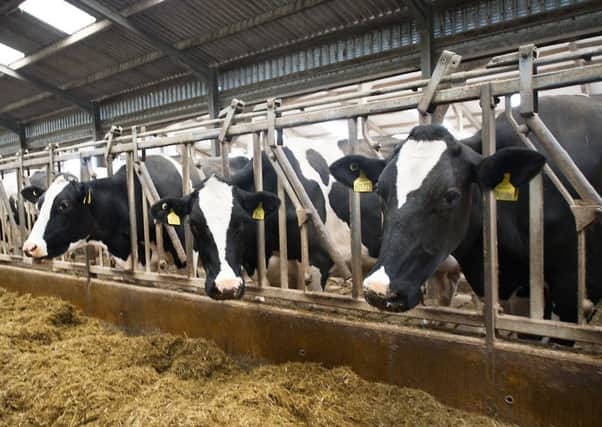It's time for '˜joined up thinking' on farm emissions
This article contains affiliate links. We may earn a small commission on items purchased through this article, but that does not affect our editorial judgement.


Speaking to members of the Scottish Parliament’s environment and rural economy committees at the NFUS annual conference, Jim McLaren, chairman of Quality Meat Scotland (QMS), said that there was currently a lack of sophistication in the way in which farm emissions were calculated.
He said that there was a real concern within the farming industry that the race to meet the Scottish Government’s ambitious targets on reducing CO2 and other harmful emissions could result in measures which would discourage production.
Advertisement
Hide AdAdvertisement
Hide Ad“There is a fear that the easy way of meeting these targets will be by the country ‘doing less stuff’,” said McLaren, “And I’m really concerned that Scottish agriculture – and especially the red meat sector – will be forced down this route.
“At the moment the targets simply focuses on the amount of fertiliser we put on and counting all the ruminants’ legs and then dividing by four – and whatever that number is constitutes our emission from livestock production.”
He called instead for measures which improved productivity and which could result in a larger number of more productive animals on the ground – such as animal health initiatives – to be viewed as a positive response rather than being viewed simply as increasing emissions.
NFU Scotland livestock chairman Charlie Adam added that misguided schemes which had not been thought through – such as encouraging distilleries to use draff as a feedstock for anaerobic digestors – had resulted in the loss of a useful and local feedstuff to many cattle producers.
He said such moves had been driven by grant funding designed to meet to meet political targets: “But when you look at the bigger picture, the simple truth is that this sort of move results in the importation of protein feedstuffs which have to be grown and sourced abroad and then transported to the farm to replace what had been the sound use of a local bye-product.”
Nominate young learners for Lantra awards, urges organiser
Employers, tutors, teachers and mentors of rural skills are being urged to nominate apprentices for Lantra Scotland’s prestigious learner of the year awards.
The awards provide Scotland’s agriculture industries with a unique way of celebrating the hard work and achievements of the country’s top trainees, according to Lantra Scotland’s director, Kevin Patrick.
“We’re looking to find the country’s most talented and successful Modern Apprentices, trainees, school pupils, mentors and secondary schools in the land-based and aquaculture sector,” said Patrick who said that the cutoff date for nominations was 11 November.
Advertisement
Hide AdAdvertisement
Hide Ad“We’ve had some fantastic finalists and winners from agriculture, aquaculture, equine, fisheries management, environmental conservation, game and wildlife, horticulture, trees and timber and land-based engineering in the past, and we’d love to have more of the same this year,” he said.
As well as industry awards across the land-based, environmental and aquaculture sectors, other categories include higher education, school pupil and rural and urban secondary schools.
Finalists will be shortlisted in early in 2017, with the winners announced at a prestigious ceremony at the DoubleTree by Hilton Dunblane Hydro in March.
Patrick said that the long-standing awards played a vital role in recognising the efforts of people throughout their careers, as well as those who offered support along the way.
“They also help encourage employers to invest in skills for the future, which is essential for a vibrant and sustainable rural economy,” he added.
